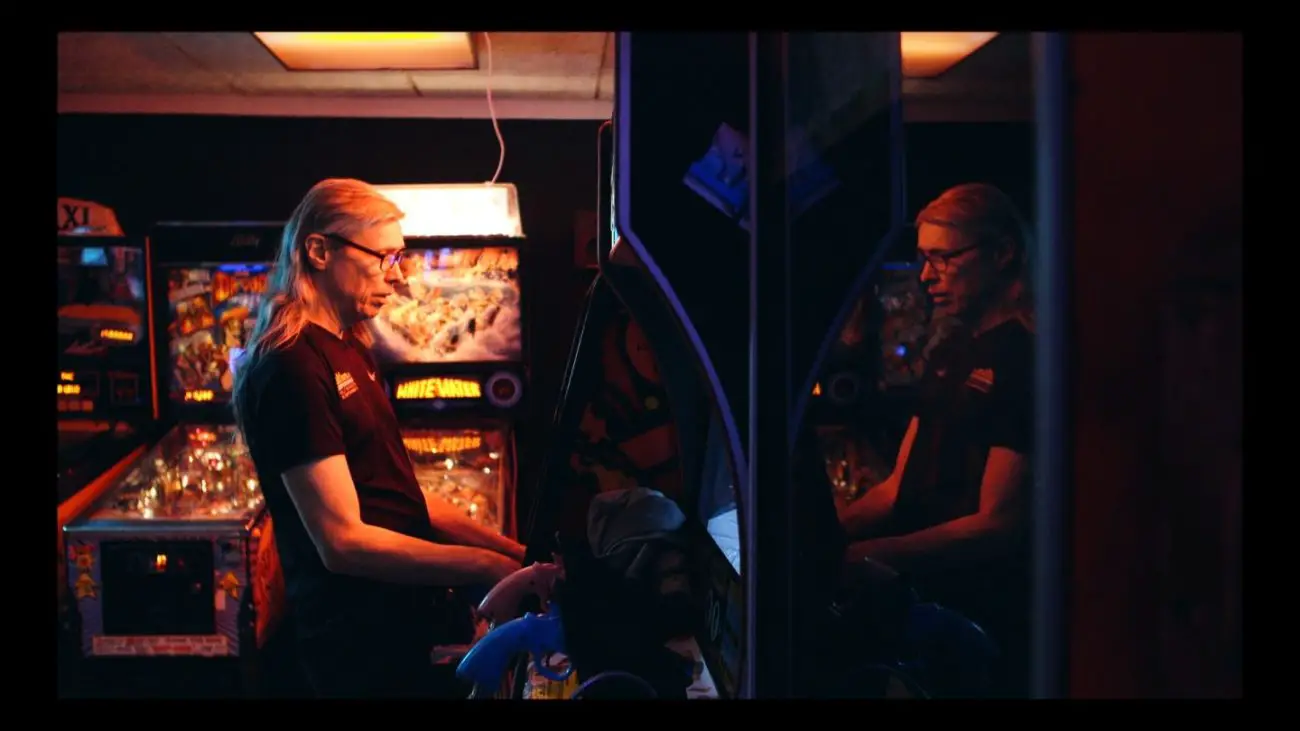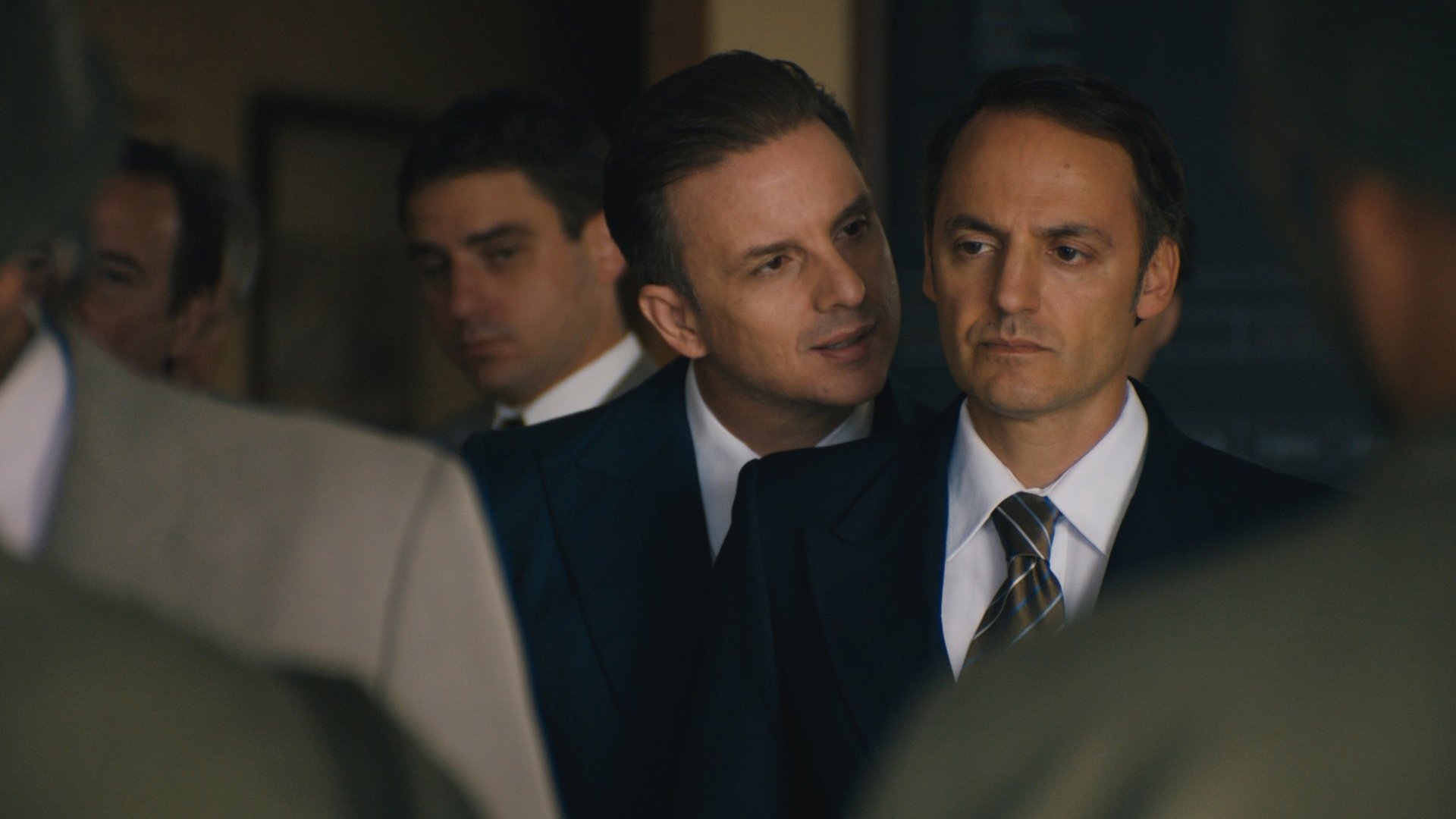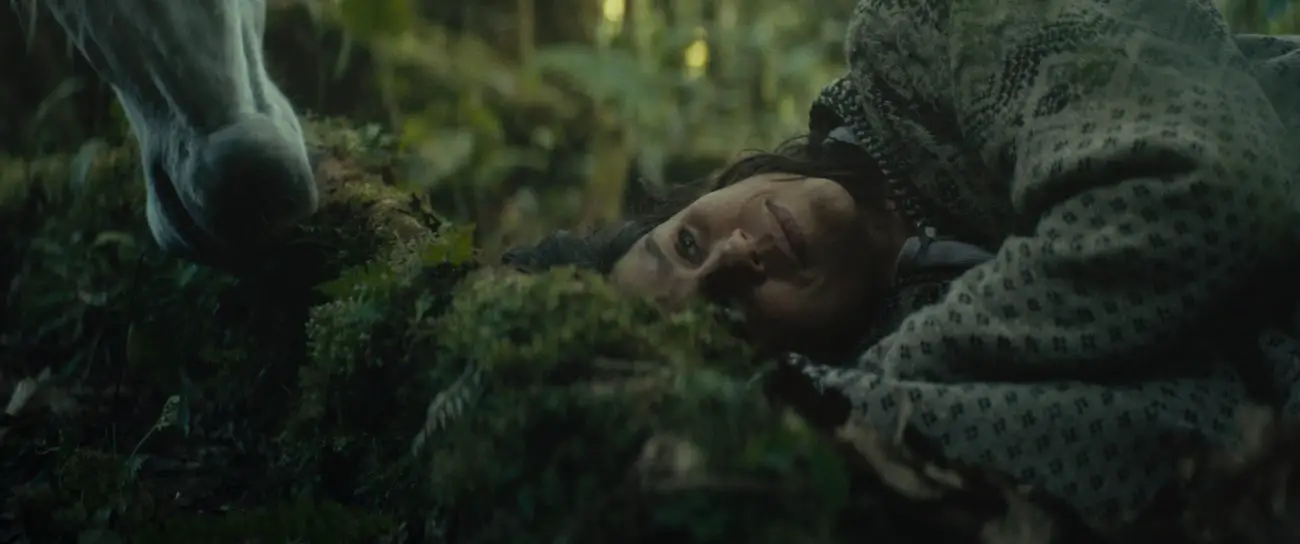This is part three of our coverage of the 2021 BFI London Film Festival; parts one and two are also available.
Cannon Arm and the Arcade Quest

This Danish comic documentary follows the efforts of the titular “Cannon Arm”, actually named Kim Kobke, to attempt to break the world record for most consecutive hours spent playing an arcade game without failing. His goal is one hundred hours on Gyruss, and he is assisted in this endeavour by his friends in the Arcade gaming community, a collection of geeks, oddballs and hobbyists keen to support their friend to the fulfilment of his goal.
Much of the humour arises from the nerdiness of its subjects juxtaposed against the implied import of a documentary subject, such as the film’s “dramatic recreation” of the moment when the idea of undertaking the feat first occurred to Kim while he was sitting on the sofa eating a banana. The film’s tone is a mixture of faux ironic and sincere grandiosity, playfully edited to accentuate the Danish dry wit. Despite the outward absurdity and pettiness of the accomplishment, playing a video game for four days straight is a genuinely demanding challenge; we’re told that one begins hallucinating after around forty hours of staring into a phasing blue kaleidoscope of spiralling pixels. Kim has to prepare with medical checkups, exercise, and supporters checking his progress, and keeping him fed and hydrated just like a marathon, though his training montage is more The IT Crowd than Rocky. Like any sporting achievement, it’s devoting oneself to the refinement of skills that are both extremely hard to maintain, yet also ultimately pointless.
Saturated in ’80s nostalgia, it’s a fun and often sincerely heartwarming look into the Arcade gaming subculture in Denmark, but the real moments of impact arise from the subjects as individuals, an assortment of middle aged adolescents each with their own interests outside of gaming: theoretical physics, the music of Bach, slam poetry etcetera. More than anything, it’s a film about a group of friends supporting and interacting with each other, sharing in a common venture to achieve something materially pointless, but which acquires value through their collective efforts to achieve it.
It’s saying something when I say that Kim, who resembles a Stephen Merchant character, is probably the most normal of the bunch, yet the film approaches them all as a friend and relays revealing moments that return agency and emotionality to this group of devoted friends. The film includes a final monologue from one of the more volatile among them, Dyst, that’s surprisingly profound in its rage and poeticism as he rails against the way society treats him as a man with autism. His simmering discontent though is a total contrast from Kim’s warm placidity, remaining unwaveringly positive whatever comes his way. He’s an almost The Dude-like figure, someone completely contented in their small apportion of niche fame and set of immaterial achievements; like The Big Lebowski, there’s a sort of comforting existentialism that arises from this contentment. It’s a warm slice of life that never takes itself too seriously, nor sacrifices the dignity of its subjects to do so.
Azor

A dark, brooding mystery drama, Azor follows a Swiss financier into the dark and troubled waters of the Argentinian dictatorship, a threatening, stuffy and airless labyrinth of open secrets, loaded statements and empty people. Dardenne brother’s regular collaborator Fabrizio Rongione plays Yvan de Wiel, who has arrived in early ’80s Buenos Aires with his wife Ines (Stephanie Cléau) to pick up the threads of his predecessor, his business partner Rene Keys, who apparently disappeared. From the moment he arrives, veiled, cryptic warnings are casually proffered that hint at the truth that those with an even passing acquaintance with Argentinian history will be on guard against from the start.
As he tries to negotiate the moral quagmire of Buenos Aires, the film often takes on something approaching the noirish inertia of an arthouse Angel Heart, with a false face of dry composure one yearns to see shattered as De Wiel goes from one roomful of rich amoral businessmen to another. The closest to a Lou Cypher this movie gets comes in the form of the Monseigneur, a malignant toad of a man with a whisper like the devil. De Wiel’s confrontation with him is a rare moment of electrification in a film that often feels unbearably stifling as our pragmatic protagonist moves through the corridors of power, doing his best to avoid the backrooms where the bodies are buried.
The journey De Wiel takes up the river of the, at best complacent, Argentine elite, following the trail of his partner, begins to accrue distant echoes of a Heart of Darkness, a trek into the unknown, on the heels of the infamous figure who proceeded him and cast a black mark on his reputation. By the end, this becomes a literal upriver journey to the illicit stronghold of the junta’s crimes. However, the film rarely develops into something truly compelling on anything but the most dryly intellectual of levels and one might well find oneself under-stimulated on that front too. It’s a gaunt, beige horror show of the mind and an under-the-radar character study of the kind of person willing to shake hands with the devil.
Clara Sola

Cannon Arm and The Arcade Quest isn’t the only film on today’s rota that includes within its focus characters who are on the autistic spectrum. It’s never outright stated that Clara (Wendy Chinchilla-Araya) is autistic, but her often child-like behaviour generally corresponds to those characteristics. She loves nature, relishes certain senses and sounds and counts passing cars and buildings on the drive to the doctor. She’s the titular protagonist of Nathalie Alvarez Mesen’s solo feature debut Clara Sola, an adult Costa-Rican woman raised in relative seclusion by her oppressive religious mother, who allows her into the community only as a faith healer. With her crooked spine and unusual behaviour, Clara is believed to be touched by the virgin Mary and that virginity is an important factor, with her mother quick to repress any sign of sexual curiosity exhibited by the fully grown Clara. However, sexual curiosity is precisely what Santiago, the young man who comes to tend their horse Yuca, arouses in her.
Despite its debutante director, the film has a strong pedigree, with a script from one of the writers of the sublime crime epic Birds of Passage, the director of photography from Aniara, Sophie Winquist, and editing by another veteran Dardenne brothers collaborator, Marie-Helene Dozo. The most impressive contribution though does come from Chinchilla-Araya; appearing a near twin to Michelle Rodriguez, her fearsome presence manages to convey a delicate balance of arrested development and latent maturity, like someone who knows more than they’re being allowed to show.
The film is so slow moving and intimate, focusing on minute details in a story that seems to be missing the broader strokes, that it takes some time to realise quite what the film is doing. Much as there is a seminal text hanging in the ether behind Azor, Clara Sola is effectively an art-house retelling of the Cinderella story. Clara is a woman raised by an oppressive matriarch who won’t let her have any fun; she has a favoured teenage niece upon whom her mother showers affection and whose forthcoming birthday celebrations form “the ball”; there’s even a lost slipper that her prince returns to her. The film is peppered with other fairy tale allusions, but the trappings are so far removed from the familiar world of fantasy that one hardly notices how many there are. The film’s climax also feels almost Carrie-inspired; it’s just unfortunate that the film doesn’t press its advantage with these more daring ideas, always pulling back from them like a candle it doesn’t want to burn itself on.
For the most part the film remains well behaved and orthodox, despite its themes of sexuality and the novelty of seeing the desire of a neurodivergent character portrayed onscreen, yet the film doesn’t press through to the other side of its magic realist touches. Perhaps the film’s budget didn’t stretch to braver territory, or maybe it was just a lack of vision on the creator’s part, or simply a desire to embrace subtlety that was perhaps safer in the long run. It’s still the case though that Clara Sola is a film I admired more for what I noticed it had in mind than for what it managed to perform onscreen.



